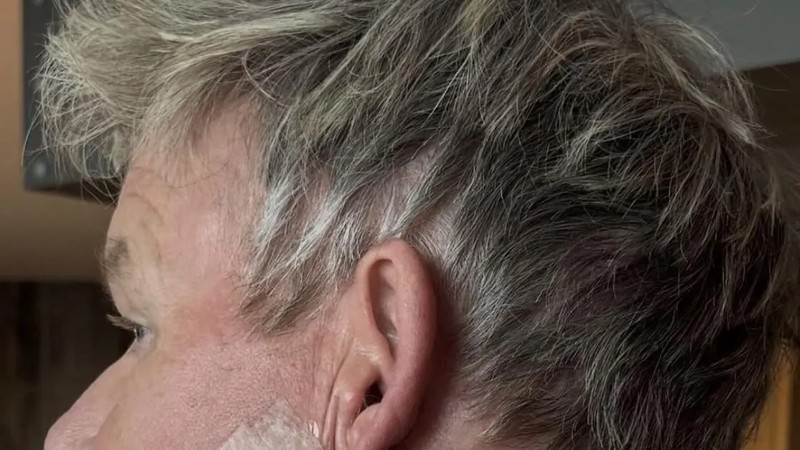
When a celebrity opens up about a health battle, it does more than make headlines; it sparks conversations we often avoid.
That’s exactly what happened when world-renowned chef and TV personality Gordon Ramsay revealed he had undergone surgery to remove a form of skin cancer.
In an Instagram post shared with his 17 million followers, the 58-year-old restaurateur posted a photo of his stitched-up scar just below his ear.
With his signature wit, Ramsay joked on Instagram, “Please don’t forget your sunscreen this weekend. I promise you it’s not a facelift, I’d need a refund!”
Behind the humour, however, was an important reminder: skin cancer is real, it’s common, and it can affect anyone, even someone as tough and high-energy as Ramsay.
Doctors removed a basal cell carcinoma (BCC) from Ramsay’s face, a type of non-melanoma skin cancer. According to the NHS, BCC is the most common form of skin cancer in the UK and typically appears on areas of skin that receive frequent sun exposure, such as the face, neck, and hands.
Basal and squamous cell skin cancer risk factors
Having light-coloured skin: Anyone can get skin cancer, but people with light-colored skin have a much higher risk than people with naturally darker skin colour.
This is because the skin pigment melanin has a protective effect in people with darker skin. Individuals with fair (light-coloured) skin that freckles or burns easily, blue or green eyes, and naturally red or blonde hair are at an especially high risk.
Albinism is an inherited condition characterised by a lack of protective skin pigment. People with this condition may have pink-white skin and white hair. They have a very high risk of getting sunburns and skin cancer, so they need to be extra careful to protect their skin.
View this post on InstagramA post shared by Gordon Ramsay (@gordongram)
Tanning beds: Artificial tanning beds also increase UV exposure and the risk of basal cell carcinoma
Being older: The risk of getting basal and squamous cell skin cancers rises as people get older. This is probably because of the buildup of sun exposure over time.
Being male: Men are more likely than women to get basal and squamous cell cancers of the skin. This is thought to be due mainly to getting more sun exposure.
Exposure to certain chemicals: Individuals exposed to certain chemicals, like arsenic, and those who have undergone radiation treatment, face heightened risks.
Previous skin cancer: People who have had a basal or squamous cell cancer have a much higher chance of developing another one.
Long-term or severe skin inflammation or injury: Scars from severe burns, areas of skin over serious bone infections, and skin damaged by some severe inflammatory skin diseases are more likely to develop skin cancers (mostly squamous cell cancers), although this risk is generally small.
Psoriasis treatment: Psoralens and ultraviolet light (PUVA) treatments given to some people with psoriasis (a chronic inflammatory skin disease) can increase the risk of developing squamous cell skin cancer and probably other skin cancers.
Ramsay used his platform to thank the “incredible” healthcare workers who treated him, while also urging fans to wear sunscreen.
His candid post quickly drew supportive messages from friends, including TV judge Robert Rinder, as well as Cancer Research UK, which commended him for raising awareness about sun safety.
Ramsay isn’t just a Michelin-starred chef; he’s also a household figure whose fiery personality has been on our screens for decades. Seeing him vulnerable, bandaged, and openly talking about skin cancer reminds us that no one is immune.
Skin cancer is the most common type of cancer worldwide. The World Health Organisation estimates that more than 1.5 million cases of non-melanoma skin cancer are diagnosed every year. While basal cell carcinoma is rarely life-threatening, it can cause significant damage if left untreated.
Dr Rachel Abbott, a consultant dermatologist with Cancer Research UK, explains: “Non-melanoma skin cancers like basal cell carcinoma are often caused by cumulative sun exposure. The risk increases as we age, but simple steps like wearing sunscreen, covering up, and avoiding sunbeds make a big difference.”
What is basal cell carcinoma?
BCC starts in the skin’s top layer and usually develops slowly. It typically does not spread to other parts of the body, but it can grow into surrounding tissue if left untreated.
Signs to look out for include:
- A shiny bump or nodule on the skin
- A patch that looks like a scar
- A sore that doesn’t heal or keeps returning
- A red, scaly area
According to the “Canadian Medical Association Journal”, using sunscreen daily can significantly reduce the risk of developing skin cancer. That’s why Ramsay’s advice, “don’t forget your sunscreen,” is more than a casual reminder. It’s a proven, protective step.
The sun safety basics
Experts recommend three golden rules when it comes to sun protection:
1. Seek shade: Avoid direct sunlight during peak hours (10am – 4pm).
2. Cover up: Wear hats, sunglasses, and lightweight clothing that covers the skin.
3. Apply sunscreen generously and often: Use broad-spectrum SPF 30 or higher, and reapply every two hours or sooner if you’re swimming or sweating.
And yes, this applies whether you’re on a beach holiday or just walking to the shops.
